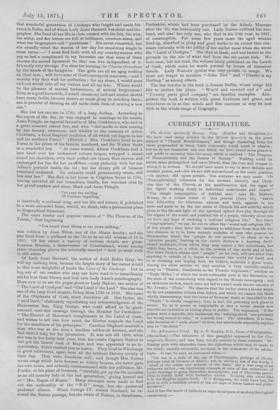CURRENT LITERATURE.
29re British Quarterly Review. July. (Hodder and Stoughton.)— We have read many articles in the British Quarterly on the great subject of " Church Establishment," and though dissenting from the views propounded in them, have commonly found much to admire ; but we do not remember any one which we have found more pleasure and profit in perusing than the essay which is entitled " The Progress
of Nonconformity and the Genius of Society." Nothing could be bettor, more philosphical and more liberal, than the tone and temper in which it is written. We should have much to say in more definite and detailed praise, and—for we are still unconvinced on the main question —in answer, did space permit. One sentence we may quote. "It (Nonconformity] witnesses for the ancient, historic, and Chris- tian idea of the Church, as the manifestation and the organ of the Spirit working freely in individual consciences and hearts."
"The simple congregation of faithful men," says Mr. Baldwin Brown, in a recent letter to this journal (June 10), "drawn into fellowship for Christian culture and work, appears to me more and more to be the one mode of Church life and activity which
gives to the life and light of the spiritual sphere free play through all the organs of the social and political life of a people, whereby alone can
we have any hope of realizing a national religious life." But those "congregations," we say, do not so affect the "social and religious life" of the people ; they have the tendency to withdraw from that life the boat element in it, to form esoteric societies of men who possess an illumination which the "people do not possess," to claim to bo a. "peculiar people," leaving in tho entire darkness a heathen, devil- owned multitude, from which they may rescue a few individuals, but which they leave, as a whole, to the powers of the world and of hell. The State Church claims that " people " as its own, will not allow that anything is outside of it, hopes to conquer this world for itself, and in so claiming and hoping does, we believe, maintain a great truth. Among the other articles we may mention a very carefully-studied essay on "Theism; Desiderata in the Theistic Argument ;" another on "Hugh Miller," of which the most noticeable part is the discussion on We state of the controversy with regard to the Mosaic cosmogony ; and an elaborate review, which does not fail to award some severe censure, of Mr. Jewett's " Plato." We observe that the writer starts a theory which we do not remember to have seen before, and which we cannot but think wholly unnecessary, that the scene of Socrates' death as described in the " Phtedo " is wholly imaginary, that, in fact, the poisoning took plane in secret. To us it seems as improbable as that a writer should now describe an execution as taking place in public. The argument, " if the poison were a narcotic, like laudanum, the walking about was precisely the wrong course to take," is scarcely fair. The attendant, it is true, tells Socrates to " walk about " at first, but afterwards expressly enjoins him to " lie down."






























 Previous page
Previous page